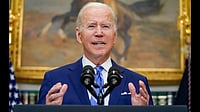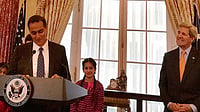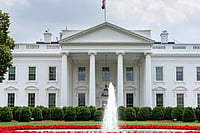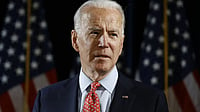US President Barack Obama, in this interview to Lalit K. Jha of the Press Trust of India, points out that Indo-US bilateral trade has grown by 40 per cent since he took over. But he also suggests that India is ripe for a new wave of reforms that would make it, globally, more competitive. Excerpts:
How do you view the current state of Indo-US ties? There is a feeling that the warmth is fading.
It’s true that in some areas we would have liked to see more momentum. Still, trade and investment between our countries has soared to record levels. We’re expanding educational and scientific exchanges, including for the 1,00,000 Indians studying in America. We’ve forged new partnerships in agriculture, health and open government. We’re working together to meet common challenges, from nuclear security to climate change. Our militaries are conducting more joint exercises than before and we agree on the importance of preventing Iran from acquiring a nuclear weapon.
Secretary of State Hillary Clinton has said it isn’t enough to talk about cooperation on nuclear energy or attracting more US investments to India. What are the hurdles in these areas?
Since I took office, bilateral trade is up by over 40 per cent, and it continues to grow at a healthy pace. With some 1.5 billion consumers between us, there’s so much more we can build as partners. So we continue to work to make it easier for our companies to do business together, including working toward a bilateral investment treaty. On civilian nuclear energy, progress in implementing the agreement has not come as fast as either of our countries would have liked. But I’m committed to its full implementation. So I was pleased that our companies have made progress toward beginning construction of new reactors in India.
There is a slowing down of the Indian economy in recent months. What are the concerns of the US?
To some extent, India’s slower growth is a reflection of the larger slowdown in the global economy. But we Americans continue to believe in the promise of India. Still, many in the US business community have expressed concern that the investment climate in India is deteriorating. They tell us that it’s still too hard to invest in India. In too many sectors, such as retail, India limits or prohibits foreign investment. It’s not the place of the United States to tell any other nation, including India, how to chart its economic future. I’d simply note that there appears to be a growing consensus in India that the time may be right for another wave of economic reforms to make India more competitive in the global economy.
Some analysts feel the US wants India to be a counterweight to the growing military-economic muscle of China in the region. Is that your view?
Our efforts are aimed at no nation. On the contrary, our increased engagement in the region is designed to advance the security, prosperity and dignity of people all across the region.
We’ve strengthened our key alliances with Japan, South Korea and Australia, and worked to deepen partnerships with emerging powers, including India. We recognise that freedom of navigation in the Indian Ocean and other shipping lanes is critical to our prosperity and the global economy. We are now India’s largest military training partner.
The US welcomes the rise of a peaceful, prosperous China. We continue to pursue a cooperative relationship with China, including greater military cooperation. I’ve always rejected the notion that one nation’s success has to come at another nation’s expense.
There are worries in India about the military and strategic vacuum in Afghanistan after the US-led forces pull out from there. What role do you foresee for India?
The United States—along with allies and partners—have devoted enormous resources to defeating Al Qaeda and making sure Afghanistan is never again used as a launching pad for attacks against our nation. Next year, in mid-2013, Afghan forces will take the lead for combat operations and coalition forces will shift from combat to support roles, and our troops will continue to come home. After 2014, NATO will continue to train, advise, assist and support Afghan forces. We will not abandon that country, or the region, to terrorists....
India’s generous contributions have helped to train Afghan police and improve the lives of the Afghan people. India’s civil service can also be a model.

From Hopeful Days
In 2008, Obama spoke to Outlook’s Ashish Kumar Sen
On US-India relations: Our agenda should include strengthening our economic relationship. I would like to see agriculture given a priority, and a ramp-up in higher education collaboration.
On Outsourcing: Workers in Chicago and Boston compete with those in Bangalore or Beijing but they need to be supported.... So, I would offer tax incentives to firms creating jobs in the US.
India-US Nuclear Deal: Once fully implemented, it would allow India to meet its growing energy demands with nuclear energy rather than burning coal.
On Military Cooperation: We are both victims of terrorist attacks—our strategic interests call for strengthening US-India military ties.
On Counter-balancing China’s Rise: The deeper relationship that I will seek is not about working against China or any other country—it is about addressing our common interests.
On Pakistan: The US should encourage the ongoing dialogue between India and Pakistan aimed at resolving the dispute over Kashmir. The US should be a strong supporter of this process.

























